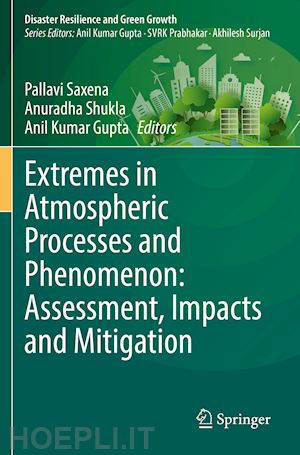
Questo prodotto usufruisce delle SPEDIZIONI GRATIS
selezionando l'opzione Corriere Veloce in fase di ordine.
Pagabile anche con Carta della cultura giovani e del merito, 18App Bonus Cultura e Carta del Docente
This edited book first gives an overview of issues in the studies of atmospheric sciences and then elaborates on extreme events in air pollution, their assessment, impacts, and mitigation strategies. It covers general overview of factors governing in atmosphere that lead to air pollution, description about recent and hazardous air pollution episodes, emergencies and extremes in atmospheric sciences, impact studies on living organisms and atmosphere related to emergencies and possible remedies/mitigation strategies which may also include green growth strategies for management.
Increase in anthropogenic activities from different sources results in very high concentrations of air pollutants in the atmospheres and they lead to cause disturbance in seasonal cycles and atmospheric phenomena, ecological imbalance and change in the quality of air. These impacts are the major cause of short-term or long-term effects on living and non-living systems. In the recent years, several instances of extremes atmosphere and air pollution related emergencies causing accidental episodes, fog, smog, health related, heat and cold wave etc. are experienced. This book brings the attention on such issues in atmospheric sciences and discuss the disaster preparedness and management plus emergencies.
This book is valuable reading material for students in Environmental Science, Biological Science, Medical Science, Policy Planning, Disaster Management and Agriculture. It’s useful for environmental consultants, researchers and other professionals involved in air quality, plant, humans and disasters related research.
Dr. Pallavi Saxena is an Assistant Professor, Environmental Science, Hindu College, University of Delhi, India. She has been awarded DST Fast Track Young Scientist Award at JNU, New Delhi, India. She has completed her Post Doc from PRL, Ahmedabad, India and Ph.D in Environmental Studies from DU in the field of atmospheric sciences. Her area of interest is air pollution and environmental health. She is serving as SSC member and earlier, served as Chair of South Asia and MiddleEast Region of ECSN in iLEAPS, UK and co-author of TOAR, USA. She has more than 45 research publications.
Dr. Anuradha Shukla is an Ex-Chief Scientist and Advisor of R&D at Transport Planning and Environment Division, CSIR-CRRI, New Delhi, India. She has completed her M.Sc and M.Tech from IIT and awarded Ph.D in Environmental Science and Engineering from JMI, Delhi. Her area of expertise is Air pollution due to Road Transport. She was a recipient of Fulbright-Nehru Environmental Leadership Program, Visiting Fellow at the University of Birmingham, U.K, International Scientist Exchange Programmer under Indo-Hungarian Program. She has also published more than 100 research papers and served as Chairperson, SWM Sectional Committee, BIS Govt. of India, Member, EAC for Projects.
Prof. Anil Kumar Gupta is Head, Environment, Climate and DRM Division, NIDM, India. He is Programme Director of CECR and implementing projects, CAP-RES, NADMP, DMP and Nodal Officer for UNCCD, UNFCCC. He is Expert Team Member of WMO Climate and South Asia Member of IUCN-CEM. He has to credit over 150 publications. He is principal editor of Springer-Nature Book series on Disaster Resilience and Green Growth. He was recipient of National Science Day Young Scientist Award, Excellence Award by the SEOH and IDRC Canada’s Thank Tank Initiative Senior Fellowship. He was Head & Director (Acting) of IEDS, Bundelkhand University.











Il sito utilizza cookie ed altri strumenti di tracciamento che raccolgono informazioni dal dispositivo dell’utente. Oltre ai cookie tecnici ed analitici aggregati, strettamente necessari per il funzionamento di questo sito web, previo consenso dell’utente possono essere installati cookie di profilazione e marketing e cookie dei social media. Cliccando su “Accetto tutti i cookie” saranno attivate tutte le categorie di cookie. Per accettare solo deterninate categorie di cookie, cliccare invece su “Impostazioni cookie”. Chiudendo il banner o continuando a navigare saranno installati solo cookie tecnici. Per maggiori dettagli, consultare la Cookie Policy.